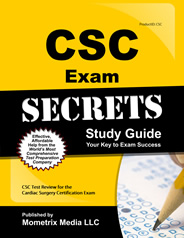Cardiac Surgery Subspecialty Certification (CSC)
Cardiac surgery is a highly specialized field within the medical profession that focuses on surgical procedures of the heart and its surrounding structures. The Cardiac Surgery Subspecialty Certification (CSC) is designed to recognize and validate the expertise of surgeons who have specialized training and experience in cardiac surgery. This certification is a testament to the surgeon's commitment to the highest standards of patient care and professional excellence.
Introduction
The Cardiac Surgery Subspecialty Certification is an advanced credential that surgeons can pursue to demonstrate their proficiency in the field of cardiac surgery. This certification is offered by various medical boards and organizations that aim to ensure that cardiac surgeons possess the necessary skills and knowledge to perform complex cardiac procedures safely and effectively. Obtaining this certification is a rigorous process that involves meeting specific eligibility criteria, passing a comprehensive examination, and maintaining ongoing professional development.
Eligibility
To be eligible for the Cardiac Surgery Subspecialty Certification, candidates must meet several criteria. These typically include:
- Medical Degree: Candidates must hold a valid medical degree from a recognized institution.
- Residency Training: Completion of a general surgery residency program accredited by the relevant medical board or authority.
- Fellowship Training: Successful completion of a cardiac surgery fellowship program, which provides advanced training in cardiac surgical techniques and patient management.
- Board Certification: Candidates must be board-certified in general surgery or an equivalent specialty.
- Clinical Experience: Demonstrated experience in performing a specified number of cardiac surgeries, which is usually verified through case logs or letters of attestation from supervising surgeons.
- Professional Standing: Candidates must be in good standing with their respective medical licensing boards and have no disciplinary actions or ethical violations.
Syllabus
The syllabus for the Cardiac Surgery Subspecialty Certification examination is comprehensive and covers a wide range of topics related to cardiac surgery. The syllabus is designed to test the candidate's knowledge, skills, and ability to apply clinical reasoning in various cardiac surgical scenarios. Key topics typically include:
- Anatomy and Physiology: Detailed understanding of the cardiovascular system, including the heart, blood vessels, and related structures.
- Pathophysiology: Knowledge of the pathophysiological mechanisms underlying various cardiac conditions such as coronary artery disease, valvular heart disease, and congenital heart defects.
- Surgical Techniques: Proficiency in a range of cardiac surgical procedures, including coronary artery bypass grafting (CABG), valve repair and replacement, and heart transplantation.
- Preoperative and Postoperative Care: Management of patients before and after cardiac surgery, including risk assessment, perioperative care, and postoperative monitoring.
- Advanced Cardiac Life Support (ACLS): Knowledge of ACLS protocols and the ability to manage cardiac emergencies during and after surgery.
- Innovations in Cardiac Surgery: Familiarity with the latest advancements and technologies in cardiac surgery, such as minimally invasive techniques and robotic-assisted surgery.
- Ethical and Legal Considerations: Understanding of the ethical and legal issues related to cardiac surgery, including informed consent and patient confidentiality.
Format of the Exam
The Cardiac Surgery Subspecialty Certification examination is typically structured to assess both theoretical knowledge and practical skills. The format of the exam may vary depending on the certifying body, but it generally includes the following components:
- Written Examination: A multiple-choice test that evaluates the candidate's knowledge of cardiac surgery principles, techniques, and patient management. This portion of the exam often includes clinical scenarios and case-based questions.
- Oral Examination: An oral assessment conducted by a panel of experienced cardiac surgeons. Candidates may be required to discuss complex cases, demonstrate clinical reasoning, and justify their surgical decision-making processes.
- Practical Assessment: A hands-on evaluation of the candidate's technical skills in performing cardiac surgical procedures. This may involve simulated surgeries or direct observation in a clinical setting.
Successful completion of the Cardiac Surgery Subspecialty Certification examination requires candidates to demonstrate a high level of competence across all components. In addition to passing the examination, certified cardiac surgeons are expected to engage in continuous professional development to maintain their certification and stay updated with the latest advancements in the field.
Conclusion
The Cardiac Surgery Subspecialty Certification is an esteemed credential that signifies a surgeon's expertise and dedication to the field of cardiac surgery. By meeting stringent eligibility requirements and passing a rigorous examination, certified cardiac surgeons affirm their commitment to providing the highest quality of care to patients undergoing cardiac procedures. This certification not only enhances the professional standing of cardiac surgeons but also contributes to improved patient outcomes and advancements in cardiac surgical practice.
Free CSC Exam Practice Questions
CSC Exam Free Sample Questions
Study Guide And Test Preparation For CSC Exam
A Complete CSC Exam Study Guide that includes sample questions, test tips and a complete study plan prepared by a team of expert and dedicated researchers. Cost-effective and qualified exam help from a committed exam preparation company.
CSC Exam Secrets (printed book)

